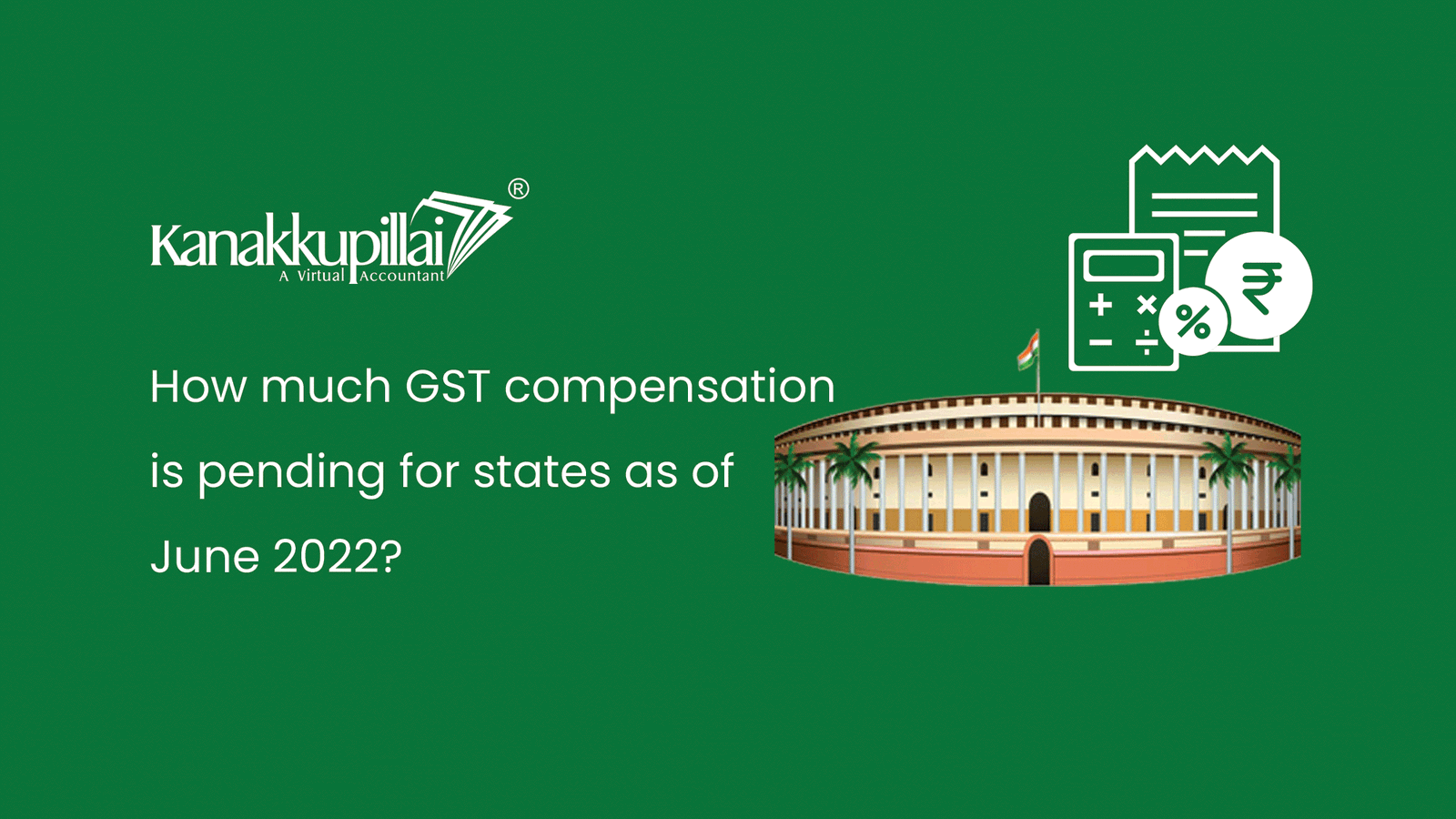![]()
How much GST compensation is pending for states as of June 2022?
The expansion for the abbreviation “GST” is “Goods and Services Tax”. In India, it is an indirect tax that has mostly superseded other indirect taxes, including the excise duty, VAT, and services tax. The Goods and Service Tax Act was approved by the Parliament on March 29, 2017, and it became effective on July 1 of that same year.
As a result, GST is levied on both the supply of goods and the provision of services. Every value addition in India is subject to the comprehensive, multi-stage Goods and Services Tax Law, which is dependent on destination. A single domestic indirect tax law, known as the GST, applies to the entire nation.
What is meant by “goods and services tax compensation”?
When the GST was implemented, states and union territories (with legislatures) were forced to cede their sovereignty to a GST Council, raising the question of what would be lost as a result of the switch from value-added tax/sales tax to GST. Any solution to this problem should have legislative support.
The Constitution (One Hundred and First Amendment) Act of 2016 stipulates in Section 18 that “Parliament shall, by law, on the recommendation of the Goods and Services Tax Council, provide for compensation to the States for loss of revenue arising on account of the implementation of the goods and services tax for a period of five years”.
As a result, the GST (Compensation to States) Act, 2017, was passed by the Parliament. According to the statute, the financial year 2015–2016 must be used as the base year to determine remuneration, and states were promised a 14%yearly income rise.
How is it funded?
The GST Council has indicated that in order to raise money for compensation, a cess is being imposed on such commodities in addition to the appropriate GST. It is known as compensatory cess. A compensating cess is currently levied on products including pan masala, cigarettes, aerated beverages, and automobiles, in addition to coal.
Who pays compensation to whom? When?
The cost of compensation must be met by the consumer. The Centre collects it and then sends it to the States. The proceeds of the compensation cess, which is a non-lapsable fund, will go to the Goods and Services Tax Compensation Fund in the public account.
The fund will distribute all compensation payments due to the states on a preliminary basis every two months based on data provided by the central accounting authority. After receiving the year’s audited accounts from the Comptroller and Auditor General of India, final adjustments will be made.
How long will it take to be paid?
According to the law, it must be paid for five years, starting on the day the GST was implemented, or until June 2022. However, a cess will still be collected in FY 2021 and FY 2022 to cover the cost of the loan taken out to compensate the states.
What is a back-to-back loan arrangement for compensation?
Due to decreased GST and GST compensation cess collections as a result of the pandemic’s economic effects, more compensation was required. The 41st and 42nd GST Council sessions discussed the topic of GST compensation to states.
In line with this, the Centre borrowed 1.1 lakh crore in FY 2021 through a special window and gave it to the states as a back-to-back loan. This was intended to assist states in filling the funding gap caused by the short-release of compensation due to an insufficient balance in the compensation fund.
By extending the levy of the compensation cess beyond 5 years to make up for the GST revenue shortfall as well as paying back the loan borrowed through a special window scheme, the Centre claims it is committed to providing the States/UTs with the full GST compensation as required by law for the transition period.
The Centre has borrowed Rs. 1.59 lakh crore from the market through a special window in the current fiscal and passed it on to the states/UTs as a back-to-back loan, as was done last year, as a result of discussions in the 43rd GST Council meeting.
Why are the states demanding an extension of the compensation?
According to the states, the implementation of the GST and how the pandemic has affected tax collection have hindered an improvement in their financial condition. They also expect a bigger deficit due to the poor rate of revenue growth and increased costs. In light of all of this, states are requesting a five-year compensation extension. Any decisions in this regard must be made by the GST Council.
Disclosure by the central government
According to the central government, states are still owed Rs. 17,176 crore in GST compensation as of June 2022.
Pankaj Chaudhary, a minister of state for finance, responded to supplements during question period by stating that the federal government is providing states with GST reimbursement for a period of five years.
The ministerclaimed that even during the COVID period, when no GST was collected, the Indian government compensated the states by taking out loans totalling Rs. 1.1 lakh crore and Rs. 1.59 lakh crore in the years 2020–2021 and 2021–2022.
The minister informed the house that only Rs. 17,176 crore in GST compensation remained unpaid as of June 2022.
In response to additional questions, Finance Minister Nirmala Sitharaman stated, “As of now, since we have somewhat cleared all the dues up to June, and approximately Rs. 17,000 crore pending is to be given”.
“Tamil Nadu’s GST compensation total as of June 2022 is Rs. 1200.6148 crore only. It cannot be considered pending until a state’s utilisation certificate is obtained”, she explained to the House.
In response to a different question, she stated that in 2022–2023, education would receive more than one lakh crore and receive more emphasis.
Additionally, she stated to the House that she and her junior minister were ready to respond to any inquiries from the audience but added that “there are panchayats in the process of asking questions”.
“Recall that the Finance Commission requested that money be transferred directly to local organisations. That has been provided. The prime minister immediately accepted the 14th Finance Commission report because of his expertise as chief minister. In that case, funds are distributed directly to local organizations”.
She informed the members that they were now sitting on money that could be used for spending on development.Other than any programme that is being carried out by the state government or local self-government through the cess that is being collected, she claimed that occasionally the central government gives more than is collected through the cess for infrastructure projects in the fields of roads, agriculture, health, and education.
“Every cess is being collected for a specific reason. The states are undoubtedly serving that specific role. There is no doubt that the centre is collecting cess. However, the centre cannot keep them; instead, that money must be used for long-term projects, which can only be carried out by the states. “Clearly, the cess and surcharges collected go entirely to the states”, Sitharaman told the House.
According to Article 270 of the Constitution, the Government of India is responsible for levying, collecting, and dividing between the Union and the State all taxes and duties mentioned in the Union List, with the exception of duties, taxes, surcharges on taxes and duties, and any cess imposed for particular purposes under any law passed by the Parliament.
The aforementioned constitutional provision, according to the finance minister’s written response, serves as the foundation for the Union Government’s cess collection and utilisation.
She added that in 2021–2022, the Centre’s gross tax revenue of Rs. 25.16 lakh crore included 28.1% in cess and surcharge collections.
She informed the House in her written response that this amounted to 25.1% of Rs. 20.27 lakh crore in gross tax revenue for 2020–2021 and 18.2% of Rs. 20.10 lakh crore in gross tax revenue for 2019–2020.
As of June 2022, according to what we have discussed so far, the states are still owed a total of Rs. 17,176 crore in GST compensation from the central government. It goes without saying that the central government will sooner or later send the appropriate compensation to the relevant states. This blog is intended to inform readers who are interested in the current situation with regard to GST compensation to the states.




